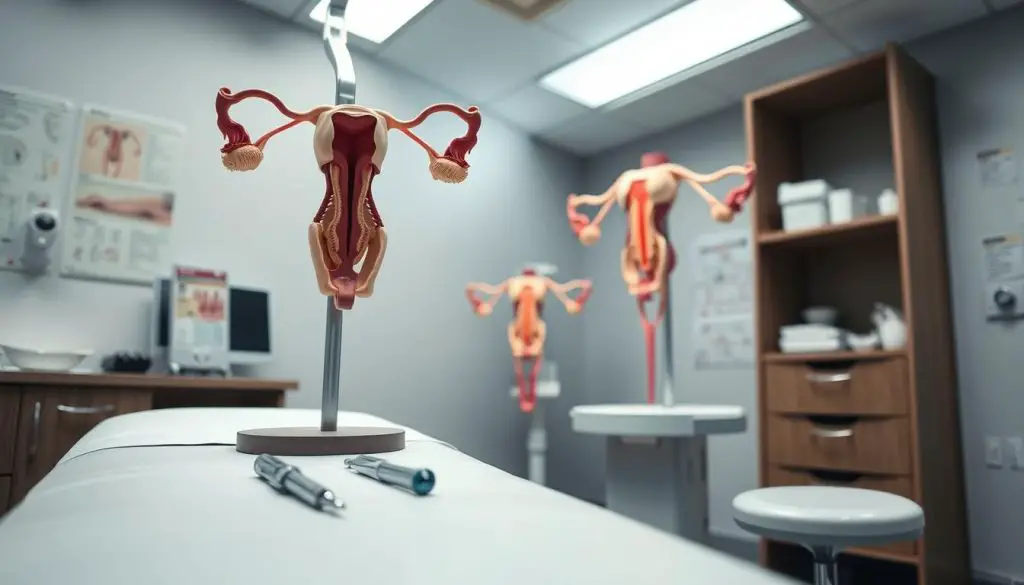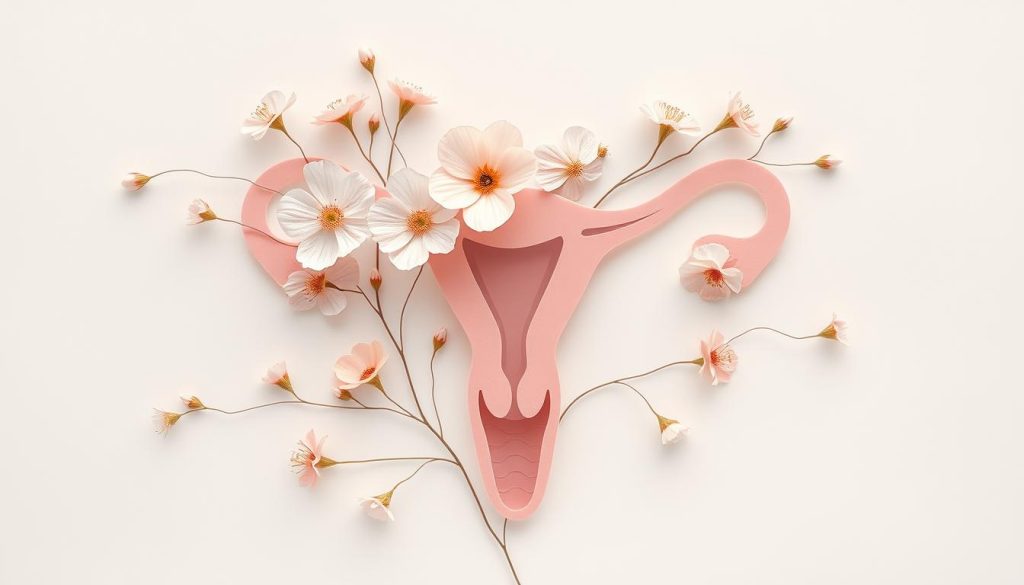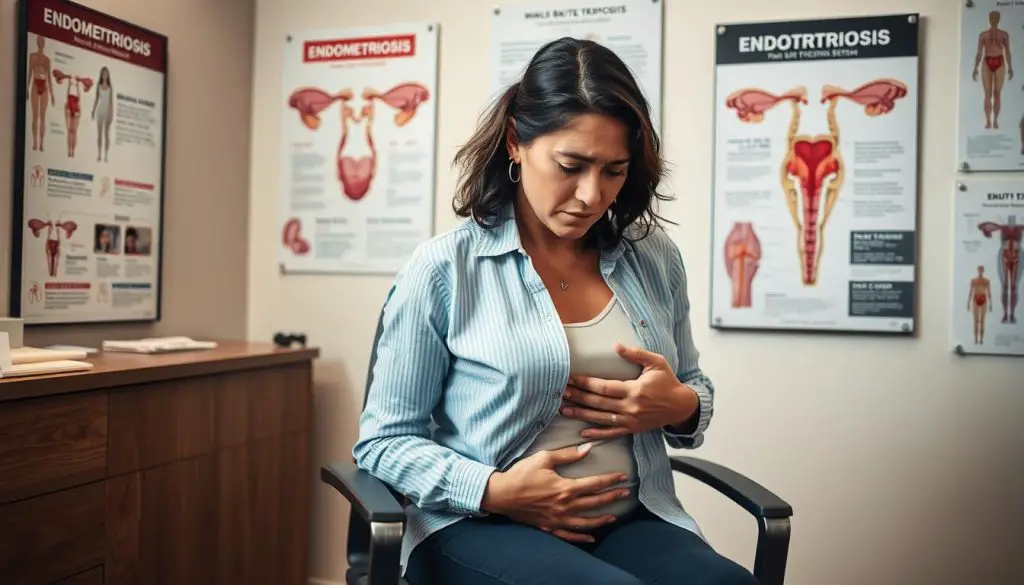Are you dealing with heavy, painful periods that are getting worse? Endometriosis might be the cause. This condition can disrupt your menstrual cycle, causing heavy menstrual bleeding, or menorrhagia. But what causes this bleeding, and how can you stop it? Let’s find out.
Endometriosis is when tissue from the uterus grows outside it, often on ovaries and tubes. This tissue bleeds during your period but can’t leave your body. This leads to inflammation, scarring, and adhesions, causing abnormally heavy periods.
The main reason for heavy periods in endometriosis is the inflammation from the misplaced tissue. This inflammation can mess with the uterus and nearby areas. It leads to excessive menstrual flow and other issues like menorrhagia and abnormal uterine bleeding.
Understanding Endometriosis: A Condition That Causes Heavy Bleeding
Endometriosis is a chronic condition where tissue like the uterus lining grows outside the uterus. It often appears on the ovaries, fallopian tubes, and other pelvic organs. This tissue thickens, breaks down, and bleeds with each menstrual cycle.
This can cause heavy, painful periods. It also leads to pelvic pain and infertility.
What is endometriosis?
Endometriosis is when tissue like the uterus lining grows outside the uterus. It usually appears on the ovaries, fallopian tubes, and other pelvic organs. This tissue reacts to menstrual cycle hormones, thickening, breaking down, and bleeding each month.
How does endometriosis lead to heavy periods?
The endometrial tissue outside the uterus causes the body to react like the normal uterine lining. This leads to heavy, painful periods. As the tissue breaks down and bleeds, it has nowhere to exit the body.
This results in heavy, prolonged menstrual bleeding. It can also cause pelvic pain, discomfort, and fertility issues.
Endometriosis is common in women and girls from puberty to menopause. It can take a long time to diagnose because its symptoms are similar to other conditions. Treatments aim to manage symptoms like pain, but there’s no cure.
Support services include managing long-term pain, fertility support, mental health support, and accessing support organizations.
The Underlying Mechanisms of Heavy Periods in Endometriosis
People with endometriosis often have heavy, painful periods. This is because of the complex ways this condition works. The main issue is the misplaced endometrial-like tissue outside the uterus. It reacts to monthly hormonal changes like the tissue inside the uterus.
This misplaced tissue thickens, breaks down, and bleeds just like the uterine lining. But, it can’t leave the body like uterine tissue does. This causes inflammation, scar tissue, and more tissue growth and breakdown.
The body tries to shed this tissue each month, leading to heavy menstrual bleeding, pelvic inflammation, and pain. Scar tissue and adhesions make these symptoms worse. This makes the monthly cycle very hard for many with endometriosis.
https://www.youtube.com/watch?v=8viFSWE_t9Q
Studies show endometriosis is linked to an imbalance in certain cytokines and growth factors. This imbalance causes ongoing inflammation and tissue growth. Knowing how endometriosis works is key to finding better treatments and improving life for those with it.
Risk Factors and Causes of Endometriosis-Related Heavy Bleeding
Many factors can raise a woman’s chance of getting endometriosis and heavy periods. Knowing these risk factors is key to managing this chronic condition.
Genetic Predisposition
A genetic predisposition is a major risk factor for endometriosis. Women with a family history of the condition are more likely to get it. This shows that there’s a genetic link to the disease.
Early Onset of Menstruation
Starting menstruation early is another risk factor. Women who start menstruating before 11 are more likely to get endometriosis. They also tend to have heavier periods.
Infrequent Pregnancy and Childbirth
Not getting pregnant often or at all can also increase the risk. Women with fewer or no children might be more likely to develop endometriosis. This can lead to heavy bleeding.
By tackling these risk factors early, we can reduce the impact of endometriosis-related heavy periods. This improves the quality of life for those affected.
Symptoms of Endometriosis: Heavy Periods and Beyond
Endometriosis is a chronic condition that affects many areas of life. It’s not just about heavy, painful periods. The symptoms can disrupt daily life in many ways.
Excessive Menstrual Flow
Heavy menstrual bleeding is a key symptom. It can include large blood clots and longer periods. People with endometriosis may also have irregular cycles.
Pelvic Pain and Discomfort
Pelvic pain is another common symptom. It can happen during menstruation, sex, or even when using the bathroom. This pain can be very severe and affect daily life.
Endometriosis can also cause spotting, blood in urine or stool, and fertility issues. Getting medical help early is key to managing these symptoms.

heavy periods causes: A Primary Symptom of Endometriosis
If you’ve been dealing with heavy, long menstrual bleeding, or menorrhagia, it might be endometriosis. This condition affects up to 10% of women of childbearing age. It’s when tissue like the uterus lining grows outside the uterus.
This tissue reacts to hormones, causing too much bleeding during your period. The heavy bleeding from endometriosis can really disrupt your life. It can also cause a lot of pain.
Up to two-thirds of women with heavy periods don’t get help because they think it’s normal.
Some signs your period might be off include:
- Bleeding that lasts longer than seven days
- Extremely painful cramps
- Soaking through pads or tampons in an hour or less
- Passing blood clots the size of a quarter or larger
- Experiencing nausea or vomiting
If you’re showing any of these signs, talk to your doctor. They can figure out what’s causing it, like endometriosis. Then, they can help you find a way to manage your symptoms.
For endometriosis-related heavy periods, treatments include hormonal birth control and gonadotropin-releasing hormone (GnRH) treatment. In some cases, surgery might be needed. Finding the cause of your heavy bleeding can help you feel better and control your cycle again.
Diagnosing Endometriosis: The Path to Understanding Heavy Periods
Diagnosing endometriosis is a detailed process. It’s key to figuring out why you have heavy periods. The first step is usually a pelvic examination. Your doctor will check your reproductive organs for size, position, and any tenderness.
If the exam hints at endometriosis, your doctor might suggest imaging tests. These include transvaginal ultrasound or MRI. They help spot where endometrial-like tissue is growing. But, they might miss some small growths.
Laparoscopy: The Gold Standard
Laparoscopy is the top choice for a sure endometriosis diagnosis. It’s a small surgery where a thin, lighted tool is used to see inside your abdomen. This lets your doctor check your organs and find endometrial-like tissue.
Early diagnosis is important because endometriosis gets worse over time. Working with your doctor and getting the right tests is the first step. It helps you understand and tackle your heavy periods.

Managing Heavy Periods Caused by Endometriosis
If you’re dealing with heavy periods due to endometriosis, there are many ways to help. Your healthcare provider can suggest pain relief medications, hormonal therapy, or surgical interventions. They will work with you to find the best treatment for your needs.
Pain Relief Medications
Over-the-counter pain management drugs like ibuprofen or acetaminophen can ease cramps and discomfort. These medications can help you manage your symptoms better.
Hormonal Therapy
Hormonal therapy is another common treatment for heavy bleeding due to endometriosis. This might include birth control pills, progesterone-only medications, or GnRH agonists. These can help regulate your menstrual cycle and reduce endometrial tissue growth.
Surgical Interventions
In severe cases, surgical interventions might be needed. Procedures like laparoscopy or hysterectomy can remove or reduce endometrial implants. This can help alleviate heavy periods and other symptoms.
When looking at endometriosis treatment options, talk to your healthcare provider about the benefits and risks. Consider your health, the severity of your condition, and your tolerance to treatments. Also, think about your fertility plans and personal preferences.
| Treatment Option | Description | Potential Benefits |
|---|---|---|
| Pain Relief Medications | Over-the-counter pain relievers like ibuprofen or acetaminophen | Helps alleviate cramps and discomfort associated with heavy periods |
| Hormonal Therapy | Birth control pills, progesterone-only medications, or GnRH agonists | Regulates menstrual cycle and reduces endometrial tissue growth |
| Surgical Interventions | Procedures like laparoscopy or hysterectomy to remove or reduce endometrial implants | Addresses the underlying endometriosis and can alleviate heavy periods and other symptoms |
Endometriosis and Fertility: The Impact of Heavy Periods
If you have endometriosis, you know about the heavy, painful periods. But, you might not know how it affects your fertility. The extra tissue outside the uterus can cause scarring and make it hard for an egg to be fertilized.
Studies show that endometriosis affects as many as 1 in 10 women during their reproductive years. About 30% of women with infertility have endometriosis. This is most common in women aged 36-45, with no racial differences.
Things that can make it harder to get pregnant with endometriosis include:
- Never giving birth
- Menstrual cycles occurring more frequently than every 28 days
- Heavy and prolonged menstrual periods lasting longer than seven days
- Having higher levels of estrogen in the body
- Having a low body mass index
- Having a structural issue with the vagina, cervix, or uterus that prevents the passage of menstrual blood
- A family history of endometriosis
- Starting the period at an early age or starting menopause at an older age
Managing heavy bleeding and symptoms is key to fertility. If you’re having trouble getting pregnant and think endometriosis might be the reason, see a reproductive specialist. With the right care, many people with endometriosis-related infertility can have a family.

Coping with Heavy Periods and Endometriosis
Dealing with heavy, painful periods from endometriosis is tough. But, with the right steps and support, you can manage symptoms and live better.
Lifestyle Adjustments
Simple lifestyle changes can ease the pain of heavy periods. Use heating pads on your belly to ease cramps. Also, skip certain foods like processed or high-fat ones.
Try relaxation techniques like deep breathing, meditation, or yoga. They help with stress and pain from endometriosis.
Emotional Support
Handling the emotional side of endometriosis and heavy periods is key. Talk to friends, family, or join a support group. Share your story and connect with others who get it.
If you’re feeling anxious, depressed, or overwhelmed, see a mental health expert. You’re not alone in this fight. With lifestyle changes and emotional support, you can manage symptoms and feel better.
When to Seek Medical Attention for Heavy Periods
If you’re dealing with heavy, prolonged menstrual bleeding that’s affecting your daily life, it’s time to see a doctor. Seek medical attention if you’re soaking through pads or tampons in an hour or less. Also, if you’re passing large blood clots or have severe cramps, it’s a sign you need help.
Heavy menstrual bleeding is a common issue, but many women don’t experience enough blood loss to be classified as heavy. Signs include needing to change sanitary pads or tampons every hour, feeling tired or short of breath, and bleeding for more than a week.
If you’re seeing vaginal bleeding that soaks at least one pad or tampon an hour for more than two hours in a row, it’s time to get medical help. This includes bleeding between periods or after menopause. Conditions like fibroids, hormone imbalances, and cancer can cause heavy menstrual bleeding.

If you’re worried about your endometriosis symptoms or abnormal menstrual bleeding, don’t wait. Reach out to your healthcare provider. Early diagnosis and treatment can greatly improve your life.
The Importance of Early Diagnosis and Treatment
Early diagnosis and treatment are key for endometriosis. This condition causes heavy, painful periods. It often goes unnoticed for years, getting worse over time. Getting medical help and the right tests can lead to treatments that ease symptoms and improve life quality.
Waiting too long to get diagnosed can make things worse. Heavy, long periods are a main symptom. Ignoring them can lead to serious problems. In fact, many hysterectomies in the U.S. are due to heavy bleeding, a common endometriosis side effect.
Getting diagnosed and treated early is important. It helps manage the condition and reduce heavy bleeding. Healthcare providers can create treatment plans that include medicines, hormones, or surgery. This can ease symptoms and improve life for those with endometriosis.
- At least 30% of hysterectomies performed in the USA are for heavy menstrual bleeding.
- The annual prevalence rate of abnormal uterine bleeding (AUB) in the United States is reported to be 53 per 1000 women.
- In the outpatient setting, AUB is one of the leading causes of outpatient gynecological visits with 20-30% of women presenting with this complaint annually.
By getting diagnosed and treated early, women with endometriosis can manage their heavy periods better. This improves their health and well-being. The best way to handle this condition is to act fast and work with your healthcare provider to find the right treatment.
Endometriosis Awareness: Shedding Light on Heavy Periods
Endometriosis affects about 1 in 10 women of childbearing age. It’s a common but misunderstood condition. Learning about heavy periods in endometriosis and treatment options is key. It helps women get the care they need and fights the stigma around it.
By teaching the public and healthcare workers, we help women with endometriosis. They get the support and resources to handle heavy menstrual bleeding. This is vital, as it can take over 7 years to get a proper diagnosis and treatment. Also, more than half of the UK’s population doesn’t know about this menstrual disorder.
Together, patients, advocates, healthcare providers, and researchers can make a difference. We can highlight the struggles of those with endometriosis and heavy periods. By spreading awareness and improving care access, we empower women to manage their health. They can find the support needed to live with this chronic condition effectively.
Source Links
- https://www.mayoclinic.org/diseases-conditions/endometriosis/symptoms-causes/syc-20354656
- https://www.healthline.com/health/endometriosis/menorrhagia-and-endometriosis
- https://www.nhs.uk/conditions/endometriosis/
- https://www.nhsinform.scot/healthy-living/womens-health/girls-and-young-women-puberty-to-around-25/periods-and-menstrual-health/endometriosis/
- https://www.mayoclinic.org/diseases-conditions/adenomyosis/symptoms-causes/syc-20369138
- https://www.ncbi.nlm.nih.gov/pmc/articles/PMC5779569/
- https://www.ncbi.nlm.nih.gov/pmc/articles/PMC9580640/
- https://my.clevelandclinic.org/health/diseases/10857-endometriosis
- https://www.ncbi.nlm.nih.gov/books/NBK567777/
- https://www.hopkinsmedicine.org/health/conditions-and-diseases/endometriosis
- https://www.topdoctors.co.uk/medical-articles/know-difference-between-regular-period-pain-endometriosis
- https://www.medicalnewstoday.com/articles/endometriosis-period-blood
- https://medlineplus.gov/ency/article/000915.htm
- https://wcorlando.com/heavy-periods-could-it-be-endometriosis/
- https://www.mayoclinic.org/diseases-conditions/endometriosis/diagnosis-treatment/drc-20354661
- https://utswmed.org/conditions-treatments/heavy-bleeding-and-painful-periods/
- https://www.ncbi.nlm.nih.gov/pmc/articles/PMC4728737/
- https://www.jeanhailes.org.au/health-a-z/periods/heavy-periods-menorrhagia
- https://www.ncbi.nlm.nih.gov/pmc/articles/PMC10241351/
- https://www.massgeneral.org/obgyn/fertility/news/endometriosis-and-its-impact-on-fertility
- https://www.healthpartners.com/blog/what-causes-heavy-periods-and-how-to-stop-them/
- https://www.ncbi.nlm.nih.gov/books/NBK279294/
- https://www.obgynassociatesmarietta.com/blog/painful-periods-and-endometriosis
- https://www.mayoclinic.org/diseases-conditions/menorrhagia/symptoms-causes/syc-20352829
- https://my.clevelandclinic.org/health/diseases/17734-menorrhagia-heavy-menstrual-bleeding
- https://www.medicalnewstoday.com/articles/what-will-er-do-for-heavy-menstrual-bleeding
- https://www.ncbi.nlm.nih.gov/books/NBK536910/
- https://www.cdc.gov/female-blood-disorders/about/heavy-menstrual-bleeding.html
- https://www.webmd.com/women/heavy-period-causes-treatments
- https://southshorewch.com/shedding-light-on-endometriosis/
- https://www.ncbi.nlm.nih.gov/pmc/articles/PMC10035241/
- https://www.mcleodhealth.org/blog/8-endometriosis-myths-couple-truths/
